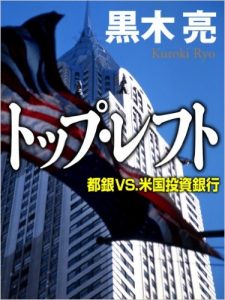 (top left Togin vs. beikokutoushiginkou – Kuroki Ryo)
(top left Togin vs. beikokutoushiginkou – Kuroki Ryo)
This is the second author I have read that writes business novels, so I can’t help but compare it to Ikeido Jun‘s works. Even though this is in the same genre, it is quite different. I’m excited that I can discover new things even within the seemingly narrow classification of business novels.
Unless you happen to be an investment banker or read the Nikkei or WSJ every day, I think Ikeido Jun’s Shitamachi Roketto or Sora Tobu Taiya would be a better entry point into the genre if you are interested in learning how people interact in Japanese businesses.
That said, if you are well versed or want to learn more about international finance, Top Left gets into the details and may be more satisfying. It is mostly set in London, but it includes travel all over the world, which adds some appeal to this book for people interested in other cultures, which you probably are if you are an English speaker reading Japanese books.
There are a couple of villain characters in this book, and the American way of banking seems to be the source of evil. As an American, I found it to be a harsh characterization. However, it really only covered top level investment bankers on Wall Street, with which I have no experience, so I can’t really say how true his characterization may be. On the other hand, the bureaucracy of Japanese banks is treated quite harshly as well, so Kuroki isn’t criticizing just one side.
Even though the characters are exaggerated, the story seems quite realistic to me because all of the bank names, people, and events mentioned are real, and only the characters and banks involved directly in the plot are fictional.
You can learn about the economic history of the late nineties, and also quite a bit about syndicate loans. I didn’t even know what they were before reading this book, but the plot is centered around competition between a Japanese bank’s London branch and American bank’s London branch to win a mandate for a syndicate loan to a Japanese auto maker’s Turkish branch who is building a factory in Iran.
There is a lot of technical language, but I don’t find this to be much of a barrier as it pertains to Japanese language difficulty. Most technical terms are international concepts that have a one-to-one English counterpart. I found myself using Investopedia.com and Wikipedia in English to understand what was going on. Usually I only use Japanese when looking things up, but I think technical terms reasonable exception. I want to leverage the small amount of financial knowledge I already have in English as much as possible.
Even with the English research there were some financial details I just let go, but it didn’t hurt my understanding of the story. Sometimes it was enough to know who won and who lost without all the details of the methods used.
This book was set in England, so a lot of the dialog is supposed to be in English. Kuroki had an interesting way of expressing this by putting some of the dialog in Katakana English. For example in the line below almost a whole sentence is written in Katakana. “As soon as possible upon the announcement of the TOB”.
「シンジケーションのローンチ(組成開始)はいつだ?」
「アズ ・ス ーン ・アズ ・ポッスィブル ・アポン ・ジ ・アナウンスメント ・オブ ・ザ ・ T O B ( T O B発表後できるだけ速やかに開始します )…」
I find the method amusing. Nice how he got the two different pronunciations of “the”. I would never notice that. This is the first Japanese book I have read set in an English speaking country, so it may or may not be the typical method to express that a conversation is in English.
Another aspect of the book being set in England that I find interesting is the description of Americans as having a strong American accent. Are you measuring the strength of an American accent by how far away it is from British English? It should be pretty far!
I had to think about this for a while. After trying to think of it from a Japanese perspective, I came to the conclusion that it just means that the speech is hard to understand from a non-native English speaker who is used to hearing British English, so it makes sense after all.
Kindle tells you how long the book takes a typical reader to finish the book. I was surprised that it was over eight hours (that probably means over 20 for me!) because most books are between four and five. This one was probably close to being broken up into a 上 and下.
I decided to stick with the tadoku style I mentioned in the last post without being too strict and looking up words when I felt like it. I think it sped up my reading pace so I could finish the long book in a reasonable time. I read slowly in English and Japanese so a month is fine for me.
I think I’ll stick with trying to read a bit faster, because I enjoy being able to discover something new by starting a new book or reading my first book from a new author.
I’m glad I picked this one up, and now I want to try other authors writing in the business novel genre to see what else I can find. This is a great book for someone interested in finance who wants to read about something beyond the borders of Japan.
